#feminist therapy
Note
Therapy, and especially psychiatry, are bourgeoisie institutions. You should quit your job, bestie.
I’m not denying the bourgeois roots of both therapy and psychiatry, however your statement is shortsighted. Myself and many other therapists (I won’t speak for psychiatrists as I am not one) put a lot of effort into decolonizing and deconstructing the more oppressive and harmful roots of our field. I work in a rural community clinic with folks primarily on Medicaid and Medicare who otherwise would not have access to mental healthcare. The waitlist for our clinic is in the hundreds. There’s a huge need for help, and I plan to be a part of giving it. My theoretical orientation includes both feminist and leftist therapy and I work hard to provide the care I would want myself as a queer, leftist woman. If therapy feels too bourgeois for you still, that’s okay. You can either search for a new therapist who fits your needs better or not go at all. I feel secure and fulfilled in the help I provide to others, bestie.
#leftist#leftist therapist#leftblr#feminist therapy#leftist feminist#counseling#therapy#therapist#ask#anon#communist#socialist#communism#socialism#anti capitalist#anti capitalism#leftist politics#mental health care#mental health matters#counselor#therapy is a human right
135 notes
·
View notes
Text
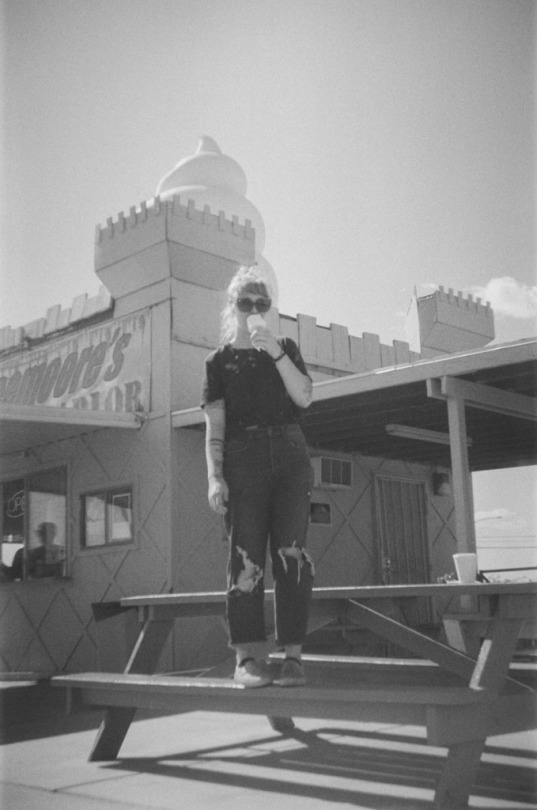
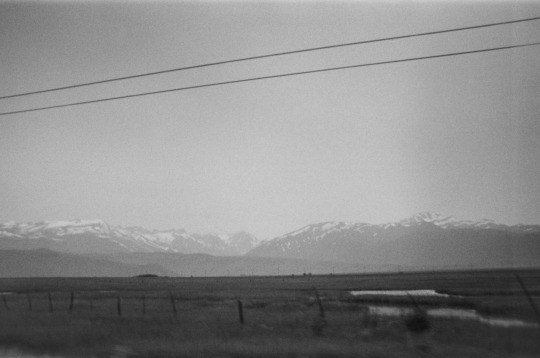
On the phone, my sister brings up feminist therapy. She says it can help me find something larger than myself to fight for. She suggests the stigma around mental illness; she knows how much it affects me, says I can break the chains if a professional shows me the way out. I choose, in that moment, to be a silent mirror. Sometimes I wonder if she ever sees me at all or only a reflection. I want to cut her off to defend my radicalism. To tell her how far back I shed the assignment of playing woman, to tell her how being loud IS the work and how I opened that door for myself. I resent the belief that making change is only done properly by joining an organization backed by money and the complimentary belief that making personal experiences public is childish. I think it's childish to participate in societies delegation of shame. Even before it was a choice, I have lived on the outside, socially ostracized. The best thing I can do with those circumstances is to use the freedom it's afforded me to shine a light on what the reality of living with severe mental illness can look like, in hopes that it normalizes public perception of people experiencing mental illness, and that my outspokenness helps to carve a path for others to step out of the darkness and gain the sovereignty to present authentically and without shame.
#me#portrait#art#punk#mental illness#bpd#stigma#mental health#therapy#trauma#outcast#shame#feminism#feminist therapy
1 note
·
View note
Text
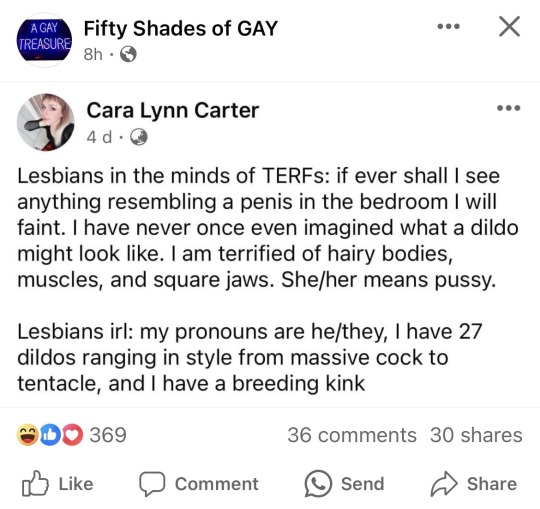
more “gay” pages posting complete homophobic garbage claiming bisexual women are lesbians
#tra homophobia#drop the t & b#of course there’s a comment calling us actual lesbians trans/biphobic 🙄#all lesbians are terfs bc homosexuality is only real if a woman is a feminist or political like what kind of homophobic logic#they think they’re so different than het men who argue all lesbians aren’t real and want a male and piv#the obsession with also equating toys to wanting a man is never ending#and i remember the poll here that showed most lesbians of course want to eat pussy most of all#and bi women wanted to use toys#like lesbians don’t want anything that looks like a dick when they have sex only bi women do and i know from experience#why the fuck would we#i wish people would stop fucking obsessing over and disecting how lesbians have sex and why#they always have to make it about males and dick#it’s socially acceptable to make creepy perverted comments always talking about or mocking lesbian sex#bi women are like why do lesbians hate us? you literally are with whole ass men calling yourselves lesbians and dykes and bonding over how#much you hate real lesbians and insinuating we aren’t real and can be fixed with conversion#therapy#people hate us so deeply for loving only women and only the female anatomy#they genuinely believe we can’t be happy being homosexuals and bring up toys as some kind of proof#the same people who can’t make women come unlike us
55 notes
·
View notes
Text
one way reading feminist literature changed my life for the better is it unironically helped my relationship with my mother so much. i was going to go into more detail but it’s probably a bit too personal for a public tumblr account lol but it really put a lot of things in perspective for me, and also gave me things i could bond with my mum over. some of the things she’s done can never be undone and our relationship is still very strained at times, but now i can approach it with a lot more understanding and maturity. and while part of this can just be credited to me growing up, i truly believe that without reading feminist literature that i would not have made this much progresss
#this is why im like super enthusiastic about the idea of feminist lit being used in therapy#or at least like. consciousness raising techniques#i think its useful for reconciliation (if desired) and useful for situating ur struggles in context#so that you arent left feeling like theres something fundamentally wrong with you
20 notes
·
View notes
Text

#lgbtqia#lgbtq community#lesbian#nonbinary#lgbt pride#lgbtq#sapphic#nonbinary lesbian#queer#gay girls#therapy#stress#mental health support#mental#mental health#burnout#radical feminist community#radical feminist safe#radical feminism#radical feminists do interact#sociology#culture#stereotypes#society#radical feminists do touch#feminism#liberal feminism#intersectional feminism#gender roles#womens rights
33 notes
·
View notes
Text

#heterorealism#heteropessimism#feminism#dating memes#childcare#gender#misandry#men aint shit#divorce him#divorce#couples therapy#feminist memes#gender roles#gender inequality#dating#dump him#feminist#men ain’t shit#relationship#breakup#wages for housework
81 notes
·
View notes
Text

a poem from the "snow pumpkin" series
.
.
.
#poeticstories#twcpoetry#writeblrcafe#bitsofstarglow#writerscreed#recognizingthevoiceless#smittenbypoetry#abstractcommunity#spilled ink#noteblr#notebook therapy#poem#poetry#poets on tumblr#poets corner#poetry community#writing community#feminist poetry#female poets#journaling
32 notes
·
View notes
Text
When I was a teenager, my father passed away from years of chronic illness and I got very depressed
I don't remember much for about a year, other than being in bed, crying. Life paused for a year or two, so that although time went on, my life didn't. Effectively ending it would've merely been a physical affirmation of what was already true: I was dead, at least, inside.
My father and I had a very close relationship. It wasn't like we got to do that many father-daughter things together, but mostly it was just that we were two faces of the same coin; similar enough to understand each other without a need for words, and to feel understood by each other, but different enough not to rub each other off the wrong way. I am far more different from my mother, and yet, the mother-daughter bond being as legendary as it is, we've always been attached to each other's hip and we have a deeply affectionate relationship. But after my father died, I felt abandoned, left out, alone. I felt like the black sheep of the family, the different one, because the one person who got me, who I was like, was gone forever. If only I'd known then what I know now: everybody tends to feel the same way at some point.
It affected my relationship with my father's side of the family. My parents were together until the end, so I'd always spent the most time with his side of the family, which lived near us, rather than my mum's, which lived farther away. My dad had been the best of his family, so I was never particularly close with anyone there except my, by then, very elderly grandparents. Without my dad, I experienced an odd feeling of disconnection; like a cable that's cut in the middle. Like, the thing that united me to them was gone, so was I even one of them any more? And it might seem strange, but actually, the fact that I had my dad's surname there was something I held onto firmly to remind myself I was still part of my family. Still, even a decade later, it's my mother's family I feel more united to.
Losing a parent at a young age was, to me, like being blown away by a bloody tornado when you were just beginning to learn how to walk on your own. And suddenly you're all alone, waking up in unknown turf, standing in the ruins of your family, your home... whatever remains when a chronic illness has been punching everyone where it hurts the most for years and years. And it took me years, and actually leaving my country, to find my footing again and stand strong again.
My point is that, for many years, I was in a deeply vulnerable and fragile mental state. I didn't seek refuge in drugs, but I did start to drink for the first time, even when I've always despised the taste of alcohol. In my late teens, it was trendy to be dark, mysterious, depressed... and none is that more than someone going through the kind of grief and heartbreak you can't make your friends understand. So my sudden drinking (not to drunkenness, but certainly completely out of my normal behaviour), my quietness, my self-isolation, were seen not as warning signs, but as cool behaviour, among my friends.
And then things got weird. I was seventeen, bursting into tears in high school, in front of everyone, because I'd misplaced something my dad had gifted me and couldn't find it. It wasn't even something important, just a pouch where to put money... but it was my dad's gift to me, and I could only find one friend who understood why it mattered to me, and helped me find it even if I was making a huge thing out of a grain of salt. And for a decade, I've been lashing out. A small feeling of discontentment or annoyance suddenly bursts into flames of fury, and I screamed at my mother, even though I'd never done it. I still go from 0 to 100 with tremendous ease; in sadness, in happiness, in anger, in laughter. Every feeling starts dull and is suddenly overwhelming. And so in the middle of these years of grief, I fell in love, went from 0 to a 100 in five minutes, and if I hadn't stopped myself right on time, I would've agreed to marry someone who simply wasn't right for me. Someone who loved me 80%, when I was there 100%. By now I've accepted that everything is always going to feel too much, too suddenly. That tears will burst out of my eyes for no particular reason, but so will laughter from my chest, and love from my heart. It is both a super power and a dangerous thing, but I'm treating it as a super power, and doing my best to control it when I can, without eradicating it.
One of the things I did in my grief was cross-dress as a man. I put on a three-piece suit that didn't really suit me, and cut my hair from long to zero, and even tried to use fake beards.
I wasn't a man. I never identified as such. I was always clear on the fact that I was seventeen and I just wanted to know "what it's like". But deep inside, it was about control. You see, I'd been left shattered, I was scrambling to keep my head above water, I had no control - and I longed for the power of being a man.
I wanted to stand strong as a man. I wanted to be like my late dad. To be a good man in the storm. To fight, to be strong, to be tough, to dress however I wanted, to stop being whistled at and catcalled, to have a man's salary, a man's work opportunities, a man's power.
It was just a period of my life. The closer to thirty I've gotten, the more comfortable I've felt as a woman, the more I've loved being a woman, the more I've remembered my father's happy eyes on me, watching me speechless the first time I put on a dress, make-up and heels, telling me how beautiful I was, taking photos non-stop with his professional camera and making me feel like a gorgeous princess. And damn it, I've never given a shit about male admiration, I've never fancied dressing "to impress", but my dad had such a way of looking at me with eyes full of wonder, not in a sexualised way, but in a "my god, you're a grown-up woman!" way, that I'd happily fight to have that back. This was the same man who, when I first got my period and was in a mood, cracked a smile on my face by grinning at me and saying "you're all grown-up now!", the same man who when I was just born, was the only one who said I was beautiful, and was too afraid of hurting me to even hold me for a wee bit, the same man who, if I was sitting alone with my head on the table going through whatever, would sit next to me and put his head on the table too, without saying anything, just so I wouldn't be alone, and the same man who'd go above and beyond to do things with me and get to know me. I don't look back on my dad as a dad, I look back on my dad as a best friend. I used to want to be just like him - now I just want to be like myself, and see in me the wonders that he saw. Now I stand proud as a woman, the woman I know he would've been stocked to know.
The Cass Report has brought back into the forefront of my mind what a pain it was to be a teenager and a young adult. In my case, it was because of Earth-shattering grief. In my case, I could want to have male things for a bit, and I got to experiment, to cross-dress, to kiss boys and girls, to make mistakes, and to, over the course of a decade, find my way back.
That is what I wish for children to be given back: the space and the time to figure things out without having to deal with more life-changing procedures.
Teens were in a mental health crisis a decade ago and it's only gotten worse since. And if my friends had seen what I was doing in my grief as alarming signs of mental health problems, instead of as a cool, trendy behaviour, then maybe I would've gone to therapy instead of opening a bottle of Vodka. I probably would've taken it wrong to be told I had mental health problems - and I would've rebelled, fought, argued, and in fact I did, the one time my mum insisted I saw somebody. God how I hated psychologists then, and now it's one of my main fields of study. I didn't want to be told I was sick any more than these kids do. But I needed to hear that. I needed my problems validated, even if I didn't want to hear it. I needed to be forced to accept help. I needed to be told grief is one thing, and feeling like you can't possibly go on is another. I NEEDED PROFFESSIONAL HELP.
That is all the Cass Report shows. That children need professional help. That children go through hell and back because they're barely equipped to deal with big shocks to the system, and the world has never been more hostile to them. And that just because alarming behaviour that points to mental health issues can be perceived as "cool" or "trendy", and become fashionable, it doesn't make it less of a mental health problem.
#the cass report#bbc#bbc news#personal#mental health#psychology#therapy#grief#mourning#father loss#parental loss#personal loss#death#depression#teens#teenager#women#feminism#feminist#transgender#children#children's rights#trans rights
7 notes
·
View notes
Text
Any ideology that says you need to take hormones and get surgeries to “be your true self” and not getting access to those things is akin to genocide is an ideology that needs to be scrutinized.
#radblr#radfem#radical feminism#radical feminists do interact#gender critical#Even if the hormones and treatments were safe#Which they’re not#Even if they were it’s still very suspicious#To act like these elective surgeries are life saving#And not having access to them is just like gay conversion therapy#Once you’re in the mindset of having to spend thousands of dollars and permanently change your body#To be your true self#And that anyone suggesting barriers is a Nazi who hates you#You are anti scientific and don’t understand the precariousness of the human body#And don’t forget they’re fucking covered by insurance in US states where insulin isn’t even covered!!!#My post
18 notes
·
View notes
Text
A feminist therapist believes that women need to hear that men "don't love enough" before they're told that women "love too much"; that fathers are equally responsible for their children's problems; that no one — not even self-appointed feminist saviors — can rescue a woman but herself; that self-love is the basis for love of others; that it's hard to break free of patriarchy; that the struggle to do so is both miraculous and life-long; that very few of us know how to support women in flight from — or at war with — internalized self-hatred.
-Phyllis Chesler, Women and Madness
2 notes
·
View notes
Text
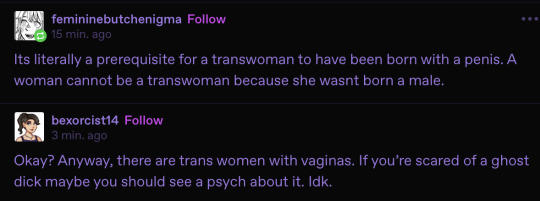
got the “accept the (surgically mutilated) dick, lesbian” treatment.
I’M the one who needs psychiatric treatment, not the one who wants to mutilate their genitals. Gotcha.
#conversion therapy#radblr#terfblr#radical feminists do interact#radical feminism#radical feminist community#terfsafe
8 notes
·
View notes
Text
Sea King update:
our hero spent the entire book like "what am I doing wrong???? How best can I serve you????? How can I make senpai notice me????"
and he finally had this epiphany that what the heroine, his delicate lady love, truly, spiritually, soulfully needed from the bottom of her heart
was for him to rail the absolute motherfucking shit out of her
and he did that!
#romance novel blogging#dilys merimydion (mermaidion bc truly he is a mermaid this man is ariel's cousin and he supports her dreams)#is the only male feminist i trust#my dude commanded the seven seas and then hopped back on the boat and was like 'i shall run my tongue over every square inch of your body#as therapy for yOU'#and gabriella went '...... k'
17 notes
·
View notes
Text
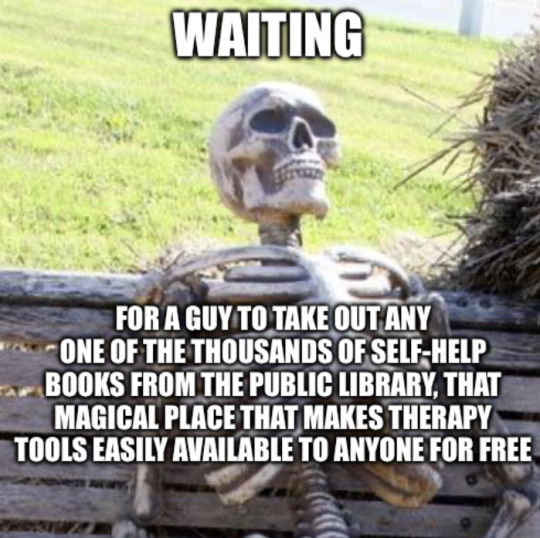
“But therapy is expensive that’s why men don’t go.”
#therapy#heterorealism#heteropessimism#feminism#dating memes#gender#misandry#dating apps#men aint shit#dating#dump him#feminist#men ain’t shit#relationship#feminist memes#divorce#breakup#heterosexual#dark feminine energy#dark femininity#mental health#lonely men
57 notes
·
View notes